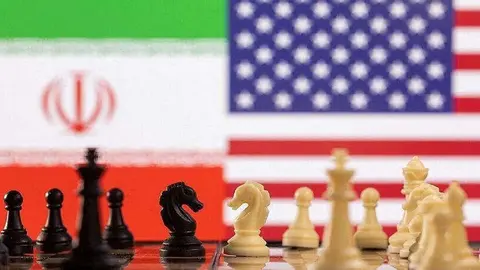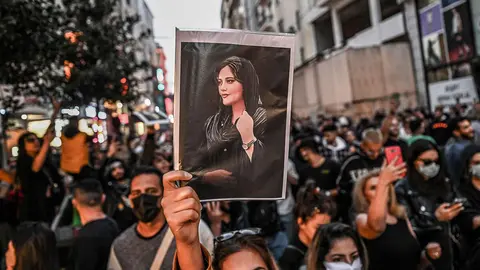At the UN, Raisi assures that Iran will not give up nuclear energy

Representatives from 193 countries are meeting these days at the United Nations headquarters in New York, where the 78th General Assembly has begun with key issues such as climate change, the war in Ukraine and food security.
Several world leaders have already had the opportunity to address the international delegations, as well as the UN Secretary General, Antonio Guterres, who highlighted the serious climate situation facing the world, urging the international community to unite and confront these threats.
During the first day of speeches on the occasion of the new opening of the body's session, the President of the Islamic Republic of Iran, Ebrahim Raisi, also had the opportunity to address the Assembly. With a copy of the Quran in hand, Raisi assured that his country would never give up its right "to have nuclear energy for peaceful purposes".

Since former US President Donald Trump unilaterally withdrew from the Iran Nuclear Deal in 2018, Tehran has begun enriching uranium beyond the limits set by the International Atomic Energy Agency (IAEA). The Iranian authorities have also removed many cameras and monitoring systems installed by the IAEA at several of the country's nuclear power plants.

In order to resume the nuclear deal and get Iran to respect international norms related to atomic energy, several countries initiated talks with Tehran and Washington, mediating between them to reach an agreement. Raisi alluded to these negotiations in his speech, calling on the US to show "goodwill" in reviving the deal. The remarks come a day after Iran and the US conducted a prisoner exchange. Washington released nearly $6 billion in frozen Iranian assets in South Korea for humanitarian use, although Iranian officials say they will use the funds for whatever they see fit.
Raisi also urged Washington to lift the sanctions, saying that this measure "has not yielded the desired results". "Now is the time for the United States to stop its wrong path and choose the right side," the Iranian president stressed.
The lifting of sanctions was one of the main disagreements in the Vienna talks on the nuclear deal. Currently, these negotiations have been frozen since August 2022 due in part to the war in Ukraine, as well as renewed tensions between the US and Iran over the latter's military support for Russia.

Tehran has been accused of supplying kamikaze drones to Moscow during its invasion of Ukraine. In this regard, Raisi pointed out during his speech that Tehran had sold the weapons to Russia before the war. The Iranian president also indicated that he was in favour of peace in Ukraine. However, since the beginning of the war, Russia and Iran have deepened their alliance in several areas.

Moreover, on the same day as Raisi's speech to the General Assembly, Russian Defence Minister Sergei Shoigu landed in Tehran to meet with Iranian counterparts to discuss the bilateral partnership. On the war in Ukraine, Raisi also accused the US of "fanning the flames of violence to weaken European countries".
In addition to nuclear energy and the war in Ukraine, the Iranian leader also spoke about changes on the international chessboard, stressing that the world "is in transition towards a new international order". "The attempt to Americanise the world has failed. The West is facing an identity crisis," he added.

Raisi's speech coincided with the anniversary of the start of mass protests in Iran following the death of young Mahsa Amini at the hands of the Morality Police for wearing the veil incorrectly. During these protests, hundreds of protesters have been killed by the regime's security forces, while others have been detained or publicly executed for participating.
Anti-Raisi protests inside and outside UN headquarters
For this reason, numerous Iranians and citizens of other nationalities demonstrated near the UN headquarters to protest against the regime and condemn Raisi's presence at the body. The demonstrators recalled the involvement of Raisi - nicknamed the Butcher of Tehran - in the massacre of 30,000 political prisoners in 1988, as well as in ongoing crimes against the Iranian people.
Outside the UN where thousands chant for “regime change in Iran” to protest Iranian President Ebrahim Raisi’s visit #ProsecuteRaisiNOW@USABehFarsi
— iranuprising (@iranuprising3) September 19, 2023
@StateDeptSpox
@USUN pic.twitter.com/HzJoR2mWmH https://t.co/VneAPyJrJk
Inside the headquarters, Israel's representative to the UN, Gilad Erdan, staged his particular protest against Raisi. Rising from his seat as the Iranian president addressed the General Assembly, Erdan held up a photograph of Mahsa Amini that read: "Iranian women deserve freedom now!". The Israeli diplomat tried to walk to the lectern where Raisi was speaking, but was held back by security.
New moral stain for the UN ‼️
— Ambassador Gilad Erdan גלעד ארדן (@giladerdan1) September 19, 2023
When President Raisi of Iran, the “Butcher of Tehran,” began his speech, I waved a picture of Mahsa Amini, the innocent Iranian woman who was brutally murdered by the regime one year ago for not wearing a hijab “properly.”
Meanwhile, outside the UN… pic.twitter.com/ZVq80Zpt9N
"While the butcher of Tehran speaks at the UN and is respected by the international community, hundreds of Iranians are protesting outside, asking the international community to wake up and help them. It is a disgrace that member states are staying to listen to a mass murderer," said Erdan, who also joined the protesters outside the building. "It should not be possible for a vile murderer who calls for the destruction of Israel to be given a platform here at the UN," he added. The Israeli ambassador to the UN also indicated that "the State of Israel supports the Iranian people".

Zelensky accuses Russia of "genocide" before General Assembly
The war in Ukraine was one of the main topics during the opening day. For this reason, Ukrainian President Volodimir Zelensky's speech was one of the most eagerly awaited.
The Ukrainian leader, in front of international delegations, including Russia, accused Moscow of genocide for abducting "tens of thousands" of Ukrainian children and transferring them to the occupied territories. Zelensky expressed concern about the future of the children being "taught by Moscow to hate Ukraine".
Zelensky speaking at the UN about Russia’s "mass kidnapping" of "tens of thousands" of Ukrainian children.
— Visegrád 24 (@visegrad24) September 20, 2023
"This is clearly a genocide," - he says
pic.twitter.com/3uiPbenBz2
Zelensky also condemned Russia's use of food prices and nuclear energy as a weapon. He also sent a message to all those countries that, since the beginning of the war, have severed ties with Russia. "You cannot trust the devil," the Ukrainian president warned. Several nations, especially in Africa, have strengthened their partnership with Russia in recent months, particularly with an eye to grain supplies.
In addition to the opening speeches, several bilateral meetings took place on the margins of the General Assembly on the first day. Zelensky, for example, met with Israeli Prime Minister Benjamin Netanyahu. This was the first face-to-face meeting between the two since the Israeli leader returned to power at the end of December.
Focused talks with @netanyahu on our cooperation, including in civil defense area.
— Volodymyr Zelenskyy / Володимир Зеленський (@ZelenskyyUa) September 19, 2023
I informed him about Russian strikes on our cities, ports, and critical infrastructure using Iranian drones.
We share concern about the increasing military cooperation between Russia and Iran. pic.twitter.com/ZPDILqkaIw
Netanyahu met with German President Olaf Scholz, with whom he discussed Israel's sale of its sophisticated Arrow 3 anti-missile system to Berlin. The Israeli Prime Minister also spoke with Turkish President Recep Tayyip Erdogan.
Prime Minister Benjamin Netanyahu is currently meeting with German Chancellor @Bundeskanzler Olaf Scholz, on the sidelines of the UN General Assembly in New York.https://t.co/bgrqkCJsnL pic.twitter.com/nEiquiyRhP
— Prime Minister of Israel (@IsraeliPM) September 19, 2023
The two countries have strengthened their relations in recent months, intensifying cooperation on key issues such as security. As The Jerusalem Post reports, the two leaders discussed the possible normalisation agreement between Israel and Saudi Arabia, as well as other regional and international issues.
Footage from Netanyahu- Erdogan meeting. Looks very cordial
— Ragıp Soylu (@ragipsoylu) September 20, 2023
pic.twitter.com/UW4CnH9s5A
A meeting between the United States, Saudi Arabia and other members of the Gulf Cooperation Council was also held on the sidelines of the 78th General Assembly. During the meeting, all parties reaffirmed their commitment to ensuring freedom of navigation in the region and maritime security. Riyadh's diplomatic engagement with Iran to de-escalate regional tensions was underlined, but Tehran was also urged to "cease its proliferation of unmanned aerial vehicles and other dangerous weapons that pose a serious threat to the security of the region".
Productive meeting with @FaisalbinFarhan and @ABZayed today at #UNGA78. We discussed the urgent need for a durable resolution to the conflict in Yemen, and other priorities. Coordination with our partners on Yemen and regional challenges is critical to peace and stability. pic.twitter.com/cc3GLsdepj
— Secretary Antony Blinken (@SecBlinken) September 20, 2023
Other issues discussed by the US and Arab delegations included the Israeli-Palestinian conflict, the territorial dispute between the United Arab Emirates and Iran over three islands, and the demarcation of the Kuwait-Iraq border.
Americas Coordinator: José Antonio Sierra.










